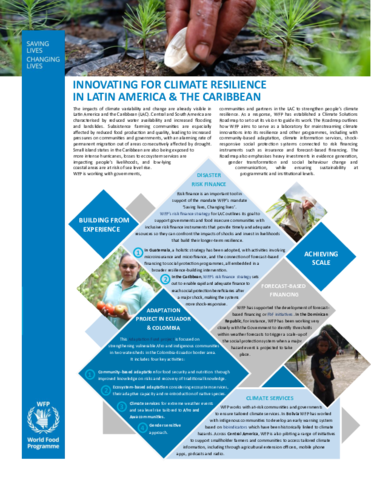
The impacts of climate variability and change are already visible in Latin America and the Caribbean (LAC). Central and South America are characterised by reduced water availability and increased flooding and landslides. Subsistence farming communities are especially affected by reduced food production and quality, leading to increased pressures on communities and governments, with an alarming rate of permanent migration out of areas consecutively affected by drought. Small island states in the Caribbean are also being exposed to more intense hurricanes, losses to ecosystem services are impacting people’s livelihoods, and low-lying coastal areas are at risk of sea level rise. WFP is working with governments, communities and partners in the LAC to strengthen people’s climate resilience. As a response, WFP has established a Climate Solutions Roadmap to set out its vision to guide its work. The Roadmap outlines how WFP aims to serve as a laboratory for mainstreaming climate innovations into its resilience and other programmes, including with community-based adaptation, climate information services, and shock-responsive social protection systems connected to risk financing instruments such as insurance and forecast-based financing. The Roadmap also emphasises heavy investments in evidence generation, gender transformation and social behaviour change and communication, while ensuring sustainability at programmatic and institutional levels.
